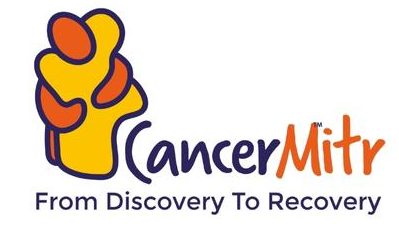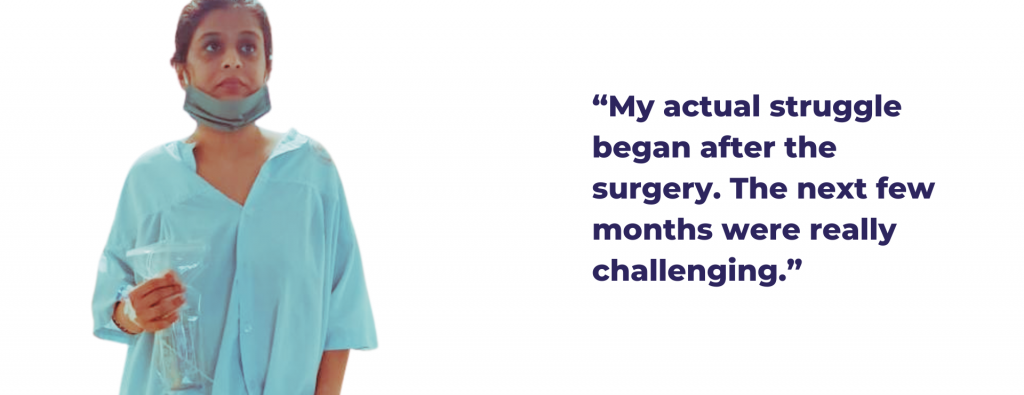It Was A Phase That Tested My Will And My Wits: CancerMitr’s Niyati Mehta On Surviving A Pancreatic Tumour
In the relentless battle against cancer, Niyati Mehta stands as a beacon of hope and resilience. As the co-founder of CancerMitr, she not only champions the cause of early screening and testing but embodies it through her own journey of triumph over a tumour of the pancreas. Beyond the professional commitment, Niyati’s passion is a fervent flame fueled by this very personal encounter. “It was my birthday. So I guess one can call it a little gift,” she reflects on her diagnosis.
Sitting down with the CancerMitr team, Niyati becomes a storyteller of survival, weaving a narrative that transcends the clinical boundaries of cancer discourse. Her hope is simple yet profound — that her journey will serve as a catalyst, inspiring individuals to embrace early screening processes.
Two years ago, as the world grappled with the sudden onslaught of COVID-19 and the economic turbulence that ensued, Niyati found herself navigating the intersection of healthcare through her NGO OncoHappy. Amidst the chaos, she forged unexpected bonds with medical experts in Bangalore, and one connection stood out — Daya Pal, a trustee of a prominent hospital who saw in her not just a colleague but a daughter.
‘We bonded well during our work together. That year, I decided to drop her a visit at her hospital on my birthday,’ she said.
As Niyati journeyed, a persistent back pain emerged, impossible to ignore. Familiar with health issues like kidney stones, she initially thought it was the usual discomfort. However, this pain, unlike any she’d felt, disrupted her ability to go about normally. During the visit, her friend Pal noticed Niyati’s distress and the impact of the pain on her. With concern on her face, she gently inquired, and in a moment of vulnerability known only to true friends, Niyati shared the intensity of her suffering. Recognizing the seriousness, Pal promptly recommended a CT scan, leading to a reality Niyati was unprepared to face.
Medical reports revealed a tumour mass measuring 5.9 cm in the anterior body region of Niyati’s pancreas. The very essence of those words etched a sobering reality.
‘You know that feeling you get when you hear a piece of bad news? Like, this is it. Your time has finally come?’ she said, ‘That’s what I had when I heard the news. In my mind, I was looking at the inevitable the minute they told me about the tumour.’
Read: From Palliative Care To Cancer Recovery: Atul Thakkar Shares His Father’s Cancer Journey
However, the doctors disputed three possibilities: adenocarcinoma of the pancreas, endocrine cancer or a benign tumour. In Niyati’s mind, an oscillation between fear and hope occurred, a tightrope of probabilities that demanded both acceptance and resilience. A benign tumour diagnosis will be a relief, but neither adenocarcinoma nor endocrine cancer would serve as good news for her.
“‘I lost my mother to breast cancer, and since then, I have been keeping myself informed on everything related to cancer.”
‘According to my research, the chances of surviving pancreatic cancer, like adenocarcinoma, with such a large tumour size, are less than three per cent. It could mean that the tumour has gone beyond its point of origin,’ she recounted.
Wanting answers, Niyati consulted experts at a respected Mumbai hospital. The story unfolded unexpectedly— a biopsy, the truth-teller in the medical world, brought both relief and new challenges. Instead of the feared pancreatic cancer, Niyati faced a rare condition called SPEN, Solid Pseudopapillary Epithelial Neoplasm.
Relief coursed through her veins at the confirmation that cancer had not claimed residency within her body. Yet, SPEN, though benign, refused to be relegated to the realm of inconsequence. Doctors, who typically suggest waiting for benign tumours, had to rethink their approach due to SPEN’s unpredictable nature.
Unlike other harmless tumours that can peacefully exist without immediate threats, SPEN had different plans. It has the potential to become malignant and metastasise or spread to other parts of the body.
A solid pseudopapillary epithelial neoplasm (SPEN) of the pancreas is a very rare neoplasm (1-2% of all reported exocrine pancreatic tumours) that is mostly reported in young women. According to a study by PubMed Central, “SPEN is a slow-growing tumour with a low-grade malignant potential, found incidentally in asymptomatic patients and symptomatic patients present with abdominal pain. The average tumour size is about 4 to 6 cm in diameter.” The condition Niyati was going through was a low-grade neoplasm with the potential of being a malignant tumour with a better prognosis. The best course of action for SPEN is surgery, though adjuvant chemotherapy or radiation is not usually recommended.
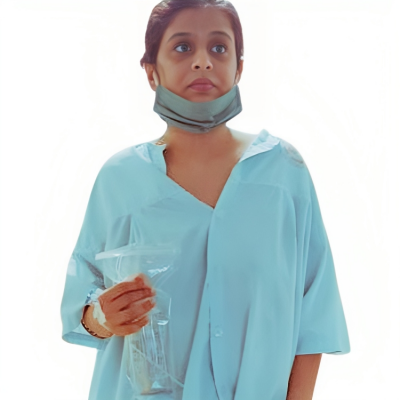
"My actual struggle began after the surgery. The next few months were really challenging."
Enduring excruciating pain, Niyati faced a challenging recovery journey after her surgery. The Nasogastric tube or “Ryles tube” introduced a new level of agony, making food consumption a painful ordeal marked by nausea and stomach cramps. The post-surgery period was compounded by an unforeseen complication—a kidney stone, unleashing a relentless cycle of pain and frequent urination. The flushing-out process forced her to urinate every 3-5 minutes while she suffered pain from surgery.
‘The pain was too much,’ said Niyati, ‘even today, I don’t think I will ever get over the post-surgery period. The pain was real, and it was excruciating. It tested my will and my wits.’
What truly gave Niyati the strong will and support was the immense support from her near and dear ones.
She started the process of getting back on her feet. It began with standing up and taking short walks with human support. Then, she started doing minor tasks, and eventually, she began to stand up without extra support or supervision. She also sought additional ayurvedic treatment to alleviate her pain. With all this, it took her a year to fully recover from the physical health issues that came with it.
‘After experiencing that level of pain, believe me when I say that anyone who pulls through is a warrior,’ she said, ‘I know warriors, including my mother.’
Niyati’s mother lost her battle with stage III breast cancer, but not before giving it a tough fight herself.
‘My mother was a tough woman. She has to face many circumstance-related challenges as a woman looking after a family. But, in most cases, she didn’t share her pain with anyone. What I went through is nothing compared to that,’ she said.
She lauds her mother as the inspiration behind her work with OncoHappy and CancerMitr. Niyati, along with her sister Mansi Mehta, experienced all the gaps in the medical system while trying to get treatment for their mother’s breast, notably the side effects of high-dose chemotherapy and radiation therapy. Together, they wanted to create a large, reliable system that guides cancer patients throughout their journey from discovery to recovery. With her own experience with a precancerous tumour of the pancreas, Niyati has an idea on how to guide a patient to their recovery.
‘I genuinely believe that if you improve the quality of the life of the patient, if you can help them get back to their feet, then you have done a pretty crucial job,’ said Niyati.
CancerMitr has helped thousands of patients in India and abroad. She praised her team for working tirelessly to provide patients and their families with hope and workable solutions. The majority of them call CancerMitr feeling helpless and terrified, but the team always succeeds in changing their perspective by the conclusion of the call.
Niyati and team CancerMitr are pushing for the need to undergo early screening and testing for cancer. “
"The unwavering support of my loved ones fueled my inner strength to new heights"
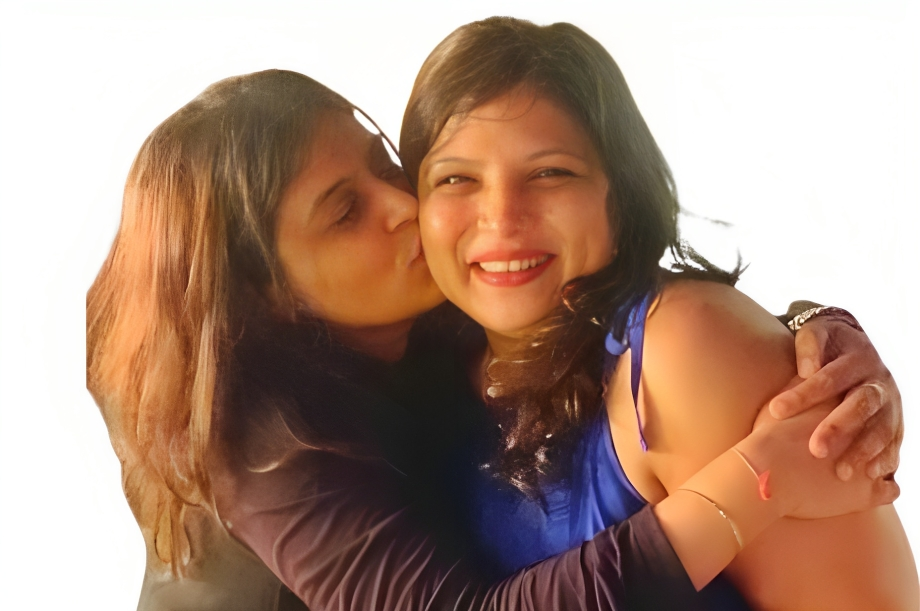
Niyati with her sister Mansi Mehta. They founded CancerMitr together in 2021.
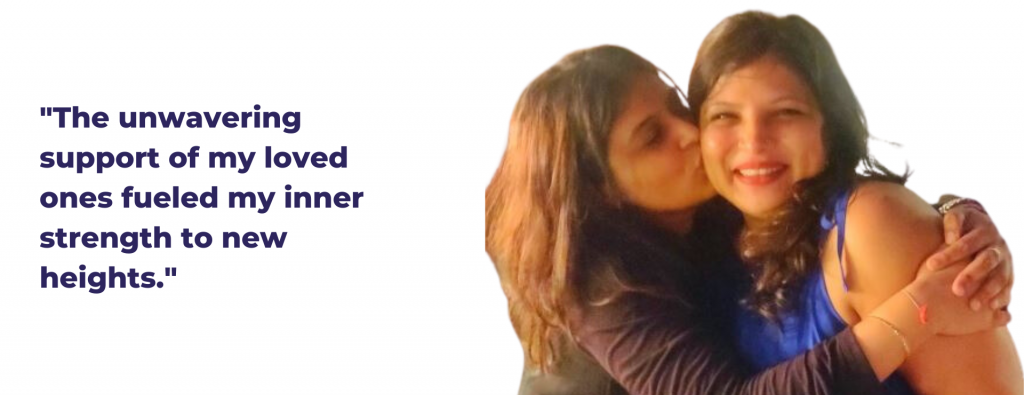
“Early diagnosis ensures a 92-100% chance of survival.“
‘In my case, I found this disease through blind luck but survived because it was caught in it’s precancerous stage and it was a low-grade tumour,” said Niyati, ‘I know that late diagnosis is what cost my mother her life. Months before her diagnosis, she had talked to my father about feeling a lump in her breast.”
Lack of awareness is one of the leading factors behind the prevalence of late diagnosis. People can catch cancer at an early stage through various tests and scans. Unfortunately, fear and stigma against the healthcare sector fuel a lack of awareness among people.
‘People should overcome these obstacles because, at the end of the day, no one will be there for our health, other than ourselves,’ she said.
CancerMitr team conducted seminars, health camps, and other awareness sessions for various corporations, societies and communities. As a result, many people who were initially apprehensive overcame their mental, social and psychological barriers to get tested for the disease.
Niyati hopes to reach out to more communities and corporates through her organization.
Are you experiencing unusual back pain or stomach cramps?
CancerMitr is there to offer suitable answers. A high rate of survival is ensured by early diagnosis. Visit our website to learn more about early diagnosis packages.
